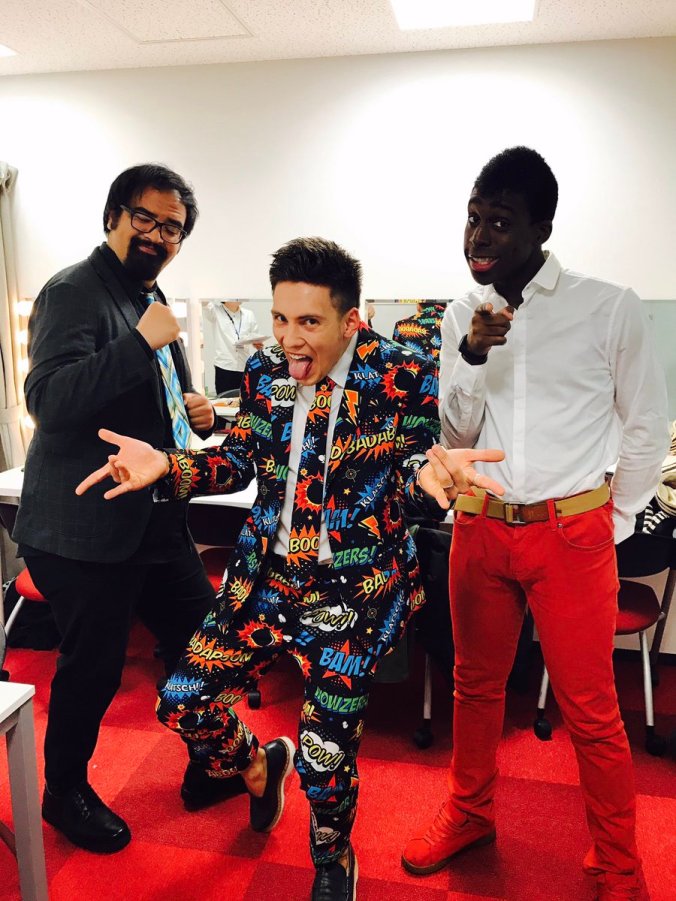Comedy in Japan versus America
On Saturday night, I had the pleasure of appearing on abemaTV’s live late night show, Muramoto Daisuke’s The Night, to participate in a discussion about comedy in Japan versus comedy in the rest of the world (namely America). While the whole fact that I showed up on Japanese TV is a story in its own right, the discussion that we had on the show really struck a chord with me. What is it about Japanese comedy that makes it hard to enjoy for foreigners and, on that same note, what is it about American comedy that makes it hard for Japanese people to enjoy?

Obviously, there is a language gap that has to be leapt between the two forms but the gulf between comedic cultures and understanding of how humor works goes beyond that. This whole discussion of Japanese comedy versus comedy “elsewhere” stems from a tweet by scientist and writer Ken Mogi. In it, he calls out “major” Japanese entertainers (not by name, mind you, but as an entire class) as being far off from the international standard of comedy and, thus, “finished”. Strong words. Predictably, this comment garnered reaction from some of the more outspoken thinkers of the Japanese comedy community. No one, after all, wants to be told that they’re a dinosaur.
日本の「お笑い芸人」のメジャーだとか、大物とか言われている人たちは、国際水準のコメディアンとはかけ離れているし、本当に「終わっている」。
— 茂木健一郎 (@kenichiromogi) March 1, 2017
So what is it that separates “big name” Japanese comedians from their foreign cousins? What is this international standard that the Japanese entertainment world can’t seem to strive for? Appearing on the same program as I did, Mogi elaborated on his comments and cited American comedy’s willingness to skewer those in power (specifically, big name stars and shows willing to make fun of Donald Trump) and generally court less safe territory than the tame terra of Japanese owarai.
Having now worked in the Japanese entertainment world for over a year now, I found myself agreeing with Mister Mogi on that point specifically. Japanese entertainers are, without a doubt, less willing to stir the pot than entertainers abroad. Comedy here is meant to be consumed by the masses and I, myself, have been told by countless executives, producers, and script writers to make my material as inoffensive and simple as possible.
The more likely your material is to offend people, the less likely you’ll find success. While this is also true in the western entertainment world, it rings especially true in Japan, where (true story) there are posters on the walls of comedy theaters telling comedians what they aren’t allowed to say. The topics contained on this list range from Disney (You aren’t even supposed to mention Mickey Mouse by name) to the yakuza (most Japanese comedy agencies have come under fire in recent years for casual “connections” with some of the biggest crime syndicates in the nation) to current events (“no one comes to a comedy show to listen to what you have to say about this week in politics”). Certain words are of course taboo due to their “indecency”.
Watching CNN’s great documentary series, The History of Comedy, I’ve really been struck by how similar the Japanese entertainment world of today is to the comedy scene in America pre-Lenny Bruce getting arrested for pushing the envelope. No one comes to the theater here expecting to be offended and no one watches television here expecting to have their views challenged. Japanese construction firms hold the view of “安全第一” or “safety first”. You might say that same slogan applies to entertainment in Japan.
Is this a bad thing? Not necessarily. If you, like Ken Mogi, are searching for deeper, more biting, edgy, cynical comedy in Japan, you’ll most likely walk away frustrated. If you are looking for innocuous fun, Japan has that in spades. Perhaps things that need to be said are left unsaid here. The envelope has been sitting on the counter for years but everyone’s mostly been too afraid to push it. Will that change? Hopefully. But I wouldn’t hold my breath.
Want more on this topic? The program featuring our discussion about Japanese comedy versus the rest of the world has been posted in its entirety on youtube (legally too, I should add!) so, if you understand Japanese, feel free to watch. This being a streaming show, we got to go a lot more in-depth than you normally can on a terrestrial broadcast.
Agree? Disagree? Don’t understand Japanese? Feel free to post in the comment section or get at me on Twitter. I’ll probably respond one way or another.
Pingback: The Comedy Landscape in 2020 Japan – The Seventh Owarai Generation and the Great Corona Pause | Stephen Tetsu